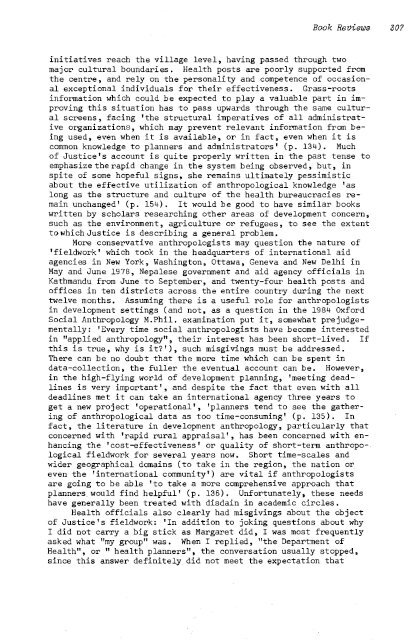CONTENTS NO.I - Institute of Social and Cultural Anthropology ...
CONTENTS NO.I - Institute of Social and Cultural Anthropology ...
CONTENTS NO.I - Institute of Social and Cultural Anthropology ...
You also want an ePaper? Increase the reach of your titles
YUMPU automatically turns print PDFs into web optimized ePapers that Google loves.
Book Reviews 307<br />
initiatives reach the village level, having passed through two<br />
major cultural boundaries. Health posts are poorly supported from<br />
the centre, <strong>and</strong> rely on the personality <strong>and</strong> competence <strong>of</strong> occasional<br />
exceptional individuals for their effectiveness. Grass-roots<br />
information which could be expected to play a valuable part in improving<br />
this situation has to pass upwards through the same cultural<br />
screens, facing 'the structural imperatives <strong>of</strong> all administrative<br />
organizations, which may prevent relevant information from being<br />
used, even when it is available, or in fact, even when it is<br />
common knowledge to planners <strong>and</strong> administrators' (p. 134). Much<br />
<strong>of</strong> Justice's account is quite properly written in the past tense to<br />
emphasize the rapid change in the system being observed, but, in<br />
spite <strong>of</strong> some hopeful signs, she remains ultimately pessimistic<br />
about the effective utilization <strong>of</strong> anthropological knowledge 'as<br />
long as the structure <strong>and</strong> culture <strong>of</strong> the health bureaucracies remain<br />
unchanged' (p. 154). It would be good to have similar books<br />
written by scholars researching other areas <strong>of</strong> development concern,<br />
such as the environment, agriculture or refugees, to see the extent<br />
to which Justice is describing a general problem.<br />
More conservative anthropologists may question the nature <strong>of</strong><br />
'fieldwork' which took in the headquarters <strong>of</strong> international aid<br />
agencies in New York, Washington, Ottawa, Geneva <strong>and</strong> New Delhi in<br />
May <strong>and</strong> June 1978, Nepalese government <strong>and</strong> aid agency <strong>of</strong>ficials in<br />
Kathm<strong>and</strong>u from June to September, <strong>and</strong> twenty-four health posts <strong>and</strong><br />
<strong>of</strong>fices in ten districts across the entire country during the next<br />
twelve months. Assuming there is a useful role for anthropologists<br />
in development settings (<strong>and</strong> not, as a question in the 1984 Oxford<br />
<strong>Social</strong> <strong>Anthropology</strong> M.Phil. examination put it, somewhat prejudgementally:<br />
'Every time social anthropologists have become interested<br />
in "applied anthropology", their interest has been short-lived. If<br />
this is true, why is it?'), such misgivings must be addressed.<br />
There can be no doubt that the more time which can be spent in<br />
data-collection, the fuller the eventual account can be. Howev.er,<br />
in the high-flying world <strong>of</strong> development planning, 'meeting deadlines<br />
is very important', <strong>and</strong> despite the fact that even with all<br />
deadlines met it can take an international agency three years to<br />
get a new project 'operational', 'planners tend to see the gathering<br />
<strong>of</strong> anthropological data as too time-consuming' (p. 135). In<br />
fact, the literature in development anthropology, particularly that<br />
concerned with 'rapid rural appraisal', has been concerned with enhancing<br />
the 'cost-effectiveness' or quality <strong>of</strong> short-term anthropological<br />
fieldwork for several years now. Short time-scales <strong>and</strong><br />
wider geographical domains (to take in the region, the nation or<br />
even the 'international community') are vital if anthropologists<br />
are going to be able 'to take a more comprehensive approach that<br />
planners. would find helpful' (p. 136). Unfortunately, these needs<br />
have generally been treated with disdain in academic circles.<br />
Health <strong>of</strong>ficials also clearly had misgivings about the object<br />
<strong>of</strong> Justice's fieldwork: 'In addition to joking questions about why<br />
I did not carry a big stick as Margaret did, I was most frequently<br />
asked what "my group" was. When I replied, "the Department <strong>of</strong><br />
Health", or " health planners", the conversation usually stopped,<br />
since this answer definitely did not meet the expectation that

















